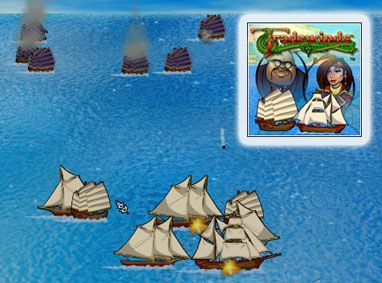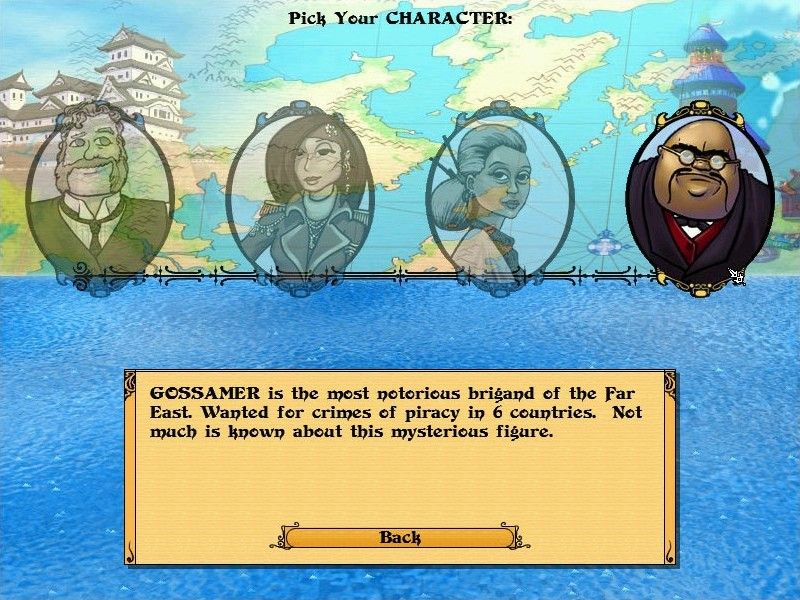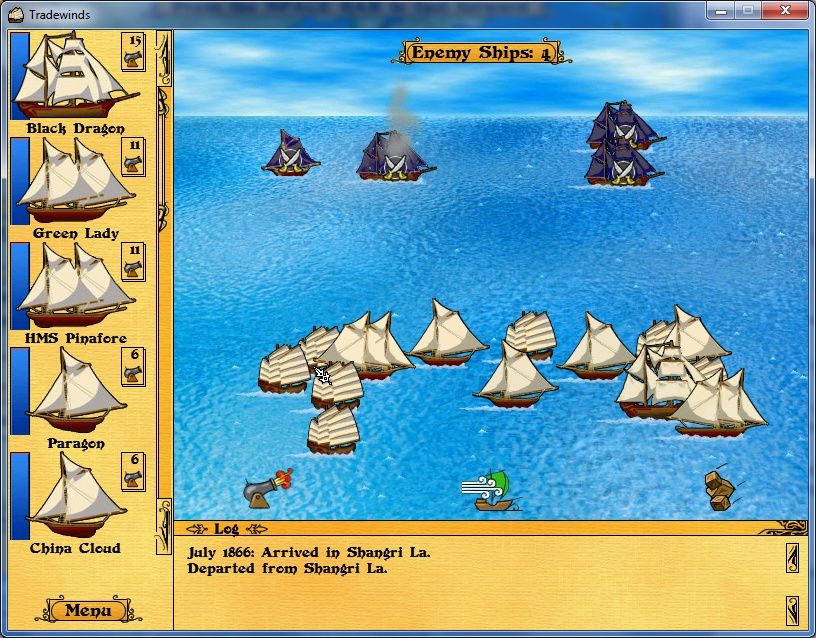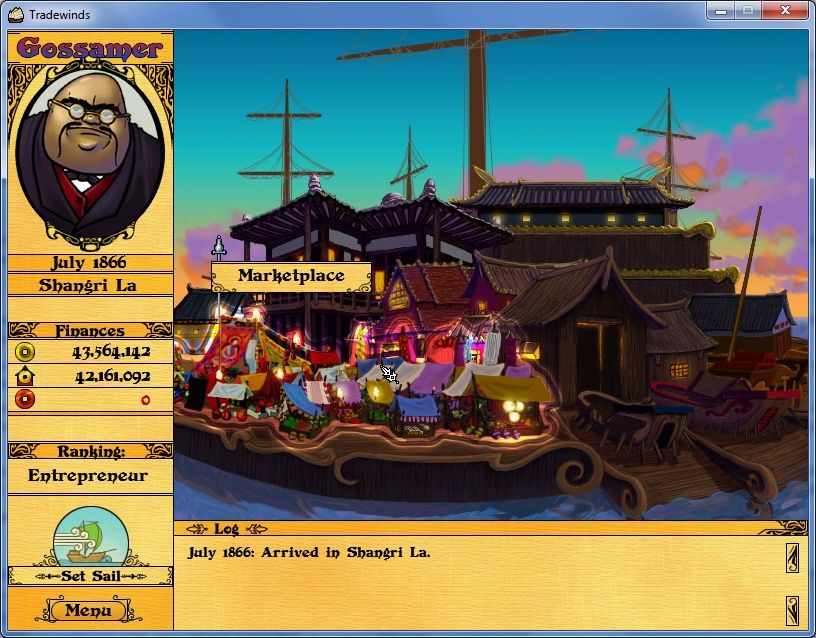Retro Replay Review
Gameplay
Tradewinds places you at the helm of a modest merchant vessel, charting a course through a vividly imagined Far Eastern archipelago. From the outset, players choose a character archetype—each with unique starting capital and special abilities—which shapes early trading strategies. Sailing between seven distinct ports, the core loop revolves around buying commodities cheaply and selling them for profit elsewhere. This simple yet addictive cycle of trade and exploration drives you deeper into the world’s economic currents.
(HEY YOU!! We hope you enjoy! We try not to run ads. So basically, this is a very expensive hobby running this site. Please consider joining us for updates, forums, and more. Network w/ us to make some cash or friends while retro gaming, and you can win some free retro games for posting. Okay, carry on 👍)
Onshore interactions add surprising depth to the trading formula. Visiting the banker ensures your hard-earned profits earn interest and stay safe from marauding pirates—though those funds become temporarily inaccessible. If coin runs short, moneylenders are poised to extend risky loans at steep interest rates. Strategic use of these services can accelerate your expansion, but missteps may leave you drowning in debt. Meanwhile, taverns provide crucial market tips and rumors, giving you an edge in anticipating price swings or uncovering hidden shipments.
Venturing back to sea, you’ll face both environmental challenges and opportunistic foes. The turn-based naval combat system is straightforward but engaging: target specific enemy ships, allocate cannon fire, and decide when to attempt a tactical retreat. Successful engagements yield bounties from port authorities, who pay handsomely for pirate heads. Over time, you’ll upgrade at shipyards—trading cargo space for more cannons or increasing hull strength—allowing you to tackle tougher adversaries and larger convoys.
Graphics
Though Tradewinds debuted in an era when 2D art dominated, its graphics remain charming and functional. The overhead map is rendered with bright, clean colors that distinguish ports, open sea, and hidden islands at a glance. Coastal towns are depicted in varied architectural styles, from bustling bazaars to silent, fog-shrouded docks, each lending the game a sense of regional character.
Ship sprites are simple but detailed enough to convey classes—from the nimble sloop to the formidable galleon. Cannonballs arc smoothly between vessels, and explosions are accompanied by quick, satisfying flashes that punctuate the sea’s otherwise calm aesthetic. When engaging pirates, the turn-based panels display ship health and cannon counts neatly, ensuring battles remain as visually clear as they are strategic.
Menus and HUD elements follow a minimalist design that keeps the focus on the map and your economic data. Commodity icons—silks, spices, tea, and more—are easily distinguishable, making trading routes and price differentials simple to manage. While not a graphical powerhouse by modern standards, Tradewinds leverages its modest visuals to support fast gameplay pacing and immediate readability.
Story
Tradewinds doesn’t rely on a grand narrative or scripted quests; instead, it weaves emergent stories through player choices and market forces. You craft your own saga as a humble trader evolving into a feared fleet admiral or a legendary pirate hunter, depending on how you navigate the world’s opportunities. Occasional scripted events—rumors of a secret floating pirate city, reports of exotic cargoes—inject narrative flavor that spurs exploration.
The real “story” emerges from the ebb and flow of supply and demand across the ports. One week, silk fetches a fortune in the northern estuary; the next, oversupply crashes its value, prompting you to seek out spices or tea on more lucrative routes. Tavern whispers and banker bulletins act like NPC dialogue, offering hints at hidden treasures or warning of pirate armadas gathering offshore. Each decision to invest, fight, or flee enriches the tapestry of your personal legend.
Although there’s no fixed ending, the sense of progression comes from amassing wealth, upgrading ships, and clearing pirate lairs. Seasoned players might pursue the whispered threshold of the secret pirate city—an elusive waypoint rumored to hold unprecedented riches. Whether you eventually retire as a merchant prince or carve your name into maritime lore, Tradewinds ensures your journey feels both player-driven and narratively cohesive.
Overall Experience
Tradewinds shines as a pick-up-and-play trading sim that balances accessibility with strategic depth. Its intuitive interface—click a port, view prices, buy low, sell high—hides a rich tapestry of risk-reward decisions. Do you stash surplus funds in the bank for interest or keep coin on hand to capitalize on sudden bargains? Early sessions are brisk, but the game’s layered mechanics keep seasoned captains plotting ever more complex trade routes.
Combat encounters provide a thrilling break from commerce, and the turn-based system never feels tacked on. Upgrading your fleet’s armament and hull capacity becomes a natural extension of your trading ambitions, as bigger ships carry more cargo but also demand ample protection. The result is a seamless loop where commerce and conflict feed into each other, and every coin spent on cannons could mean a safer voyage—and higher profits.
For potential buyers seeking a laid-back yet engaging maritime adventure, Tradewinds delivers hours of emergent storytelling and economic strategy. Its modest system requirements and straightforward mechanics make it ideal for casual sessions or deep, multi-hour campaigns. While modern titles may boast 3D graphics and voice-acted NPCs, Tradewinds offers pure, undiluted trading fun, reminding players why the genre endures. Embark on your voyage and discover if you have the cunning, courage, and fiscal finesse to conquer the Far Eastern seas.
 Retro Replay Retro Replay gaming reviews, news, emulation, geek stuff and more!
Retro Replay Retro Replay gaming reviews, news, emulation, geek stuff and more!









Reviews
There are no reviews yet.